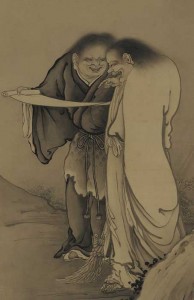
Japanese hanging scroll by Hashimoto Gaho of Han-shan and Shih-te (Kanzan and Fittoku), eccentric Ch’an (Zen) hermit-monks from Tang Dynasty, whose poetry is popular in the west.
Han-shan (“Cold Mountain”), and his sidekicks Shih-te (“Pick Up” or “Foundling”), and Fengkan (“Big Stick” as he was six-foot tall), were known as the “Tian-tai Trio,” wandering Tang Dyansty lunatic hermit-monks, who sometimes lived at the Guoqing Temple of the Tian-tai sect in the Tian-tai mountain range by the East China Sea. They, like Monk Ji-gong, were known for their unconventional (deliberate) behavior as well as their poetry. In fact, they were incarnations of famous Bodhisattva. An ordinary person cannot see through a holy being. One moment they are madmen and the next they are idiots. Only in the end did people realize one of them was Manjushri Bodhisattva and the other was Samantabhadra Bodhisattva. There was a time in history when all the monastics at mount Tian-tai were at the very least Arhats. Even the cook there was the incarnation of Kuan Yin Bodhisattva and the abbot was the incarnation of Amitabha Buddha. Everyone who went there did not understand what the real situation was.
The following poem is by Han-shan:
Children, I implore you
get out of the burning house now.
Three carts await outside
to save you from a homeless life.
Relax in the village square
before the sky, everything’s empty.
No direction is better or worse,
East just as good as West.
Those who know the meaning of this
are free to go where they want.
SOURCE of POEM: Red Pine (Bill Porter), The Collected Songs of Cold Mountain.
